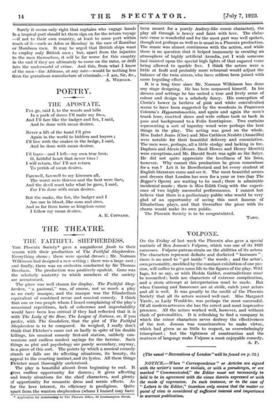THE THEATRE.
THE FAITHFUL SHEPHERDESS.
THE Phoenix Society* gave a magnificent finale to their season with their production of The Faithful Shepherdess. Everything shone ; there were special dresses ; Mr. Norman Wilkinson had designed a new setting ; there was a large east; and finally, there was an orchestra conducted by Sir Thomas Beecham. The production was positively opulent. Gone was the scholarly austerity to which members of the society are _accustomed.
The piece was well chosen for display. The Faithful Shep- herdess, "a pastoral," was, of course, not so much a play as an early masque, and the masque was the Elizabethan equivalent of combined revue and musical comedy. I think that one or two people whom I heard complaining of the play's occasional repetitions, lack of coherence and improbability would have been less critical if they had reflected that it is with The Lady of the Rose, The League of Notions, or, if you prefer, with The Gondoliers, that the plot of The Faithful Shepherdess is to be compared. So weighed, I really don't think that Fletcher's came out so badly in spite of his double killings, his musical comedy first-aid station, unlikely con- versions and endless modest sayings for the heroine. Such things as plot and psychology are purely secondary, anyway, in a piece of this sort. The points by which a musical comedy stands or falls are its affecting situations, its beauty, its appeal to the courting instinct, and its lyrics. All these things Fletcher most thoroughly understood.
The play is beautiful almost from beginning to end. It gives endless opportunity for dances ; it gives affecting and lonely situations for the chief characters, and plenty af opportunity for romantic dress and scenic effects. As for the love interest, its efficiency is prodigious. Quite apart from the wanton shepherdess (whom I hazard may have
• Application for membership to The Phoenix Mee, 36 Southampton Street.
been meant for a purely Audrey-like comic character), the play all through is heavy and faint with love. The elabo- rate verse is wonderful and for the most part was well spoken, though not perhaps so well as is usual in a Phoenix production. The music was almost continuous with the action, and while there is no question that it helped immensely in creating an atmosphere of highly artificial Arcadia, yet I wish someone had insisted upon the special high lights of that sugared verse being allowed to sparkle free. I think the actors were a little at fault and probably more rehearsal would adjust the balance of the twin sisters, who have seldom been joined with more beguiling effect.
It is a long time since Mr. Norman Wilkinson has done any stage designing. He has here surpassed himself. In his dresses and settings he has united a true and lively sense of colour and design to a scholarly fancy. His conception of Clorin's bower (a beehive of pink and white convolvulus) seems to have been suggested by the woodcuts in Francesco Colonna's Hypnerotornachia, and again and again the men's trunk hose, rosetted shoes and wide collars took us back in pose and background to a Folio frontispiece. Two curtains representing a sort of tapestry wood were perhaps the best things in the play. The acting was good on the whole. Miss Isabel Jeans (Cloe) and Miss Cathleen Nesbitt (Amarillis) were notable for their beautiful delivery and enunciation. The men were, perhaps, all a little stodgy and lacking in fire. Daphnis and Alexis (Messrs. Basil Howes and Henry Hewitt) were exceptions,and Mr. Harold Scott was agile as the Satyr. He did not quite appreciate the loveliness of his lines, however. Why cannot this production be given somewhere for a run ? Let it be Bowdlerized and let every student of English literature come and see it. The most beautiful scenes and dresses that London has seen for a year or two (bar The Beggar's Opera) are waiting to be used ; there is admirable incidental music ; there is Miss Edith Craig with the experi- ence of two highly successful performances. I cannot but believe that there is a preliminary public who would be very glad of an opportunity of seeing this most famous of Elizabethan plays, and that thereafter the piece with its charm would make its own public.
The Phoenix Society is to be congratulated. TARN.














































 Previous page
Previous page